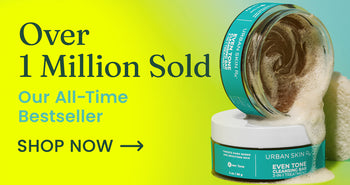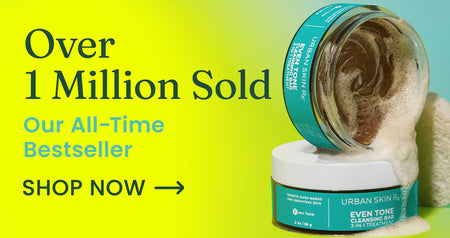How To Use Exfoliating Body Scrub To Get Rid of All That Dead Skin

Now is the time to forget everything you were taught from TLC’s 90’s hit “No Scrubs.” Here at Urban Skin Rx®, we are all about the scrubs.
Body scrubs are a great way to cleanse and exfoliate your skin. This way of cleaning your skin will benefit and brighten your skin in many ways. Because exfoliating your skin removes the top layer of dead skin cells, it simultaneously stimulates collagen production, leaving your skin firm and bright.
Exfoliating will also help improve the effectiveness of your other topical skin treatments. By exfoliating before applying a moisturizer, the moisturizer will be able to reach an even deeper layer of the skin instead of simply sitting on the surface. This is true with facial exfoliants and body scrubs. Additionally, using an exfoliant is ultra relaxing and is basically a massage that also helps your skin.
How Frequently Should You Use Body Scrub?
Because exfoliating your skin is a pretty in depth process for your skin, it’s best to be mindful of over exfoliation. Over exfoliation can lead to your skin being dry, extra sensitive and generally irritated.
- It’s best to exfoliate your skin a maximum of twice a week.
- If you have a skin condition, consult a dermatologist first.
- When applying an exfoliant, do so in the bath or shower by massaging the scrub gently into your skin, then rinsing off thoroughly.
Making a Body Scrub
Making your own scrub is an awesome way to spice things up for both your skin-care and self-care. You can’t really go wrong if you are using good ingredients. Here’s some of our favorite ingredients to include in a homemade body scrub:
- Coconut oil, jojoba oil, grape seed oil, almond oil or olive oil
- Essential oil such as lavender, peppermint or lemon (only a few drops at a time)
- Honey
- Green tea
- Salt or sugar
- Coffee grounds
- Oatmeal
In general, you’ll want to avoid exfoliating skin that is especially tender, has an injury such as a burn or scratch, or is chapped. Avoid exfoliating skin that is sunburnt, chapped, injured or recovering from a skin treatment such as a chemical peel
These natural alternatives are a fun way to keep your skin routine interesting. Homemade exfoliants are a great tool, but you should use caution when using them, especially if you’re prone to dry or sensitive skin.
Expanding on Exfoliation
Your skin’s natural cycle happens about every 30 days. When this occurs, your body sheds the top layer of your skin, revealing new skin underneath.
Sometimes this turnover isn’t as clean as it sounds though. If you aren’t shedding that dead skin, you are likely experiencing flakiness or dry patches which lead to clogged pores. Exfoliation ensures that the top layer of your skin does indeed slough off, allowing for new skin to take its place.
The Difference Between Body and Face Exfoliation
It’s no secret that the skin on your body and your face are different ball games. When exfoliating your body, here are some tips you’ll want to follow.
- You can get away with using a grittier, more coarse product to get rid of all that dead skin around your body than you can on your face. You’ll want to begin by applying a reasonable, nickel-sized amount into your hand and go area by area.
- After you have massaged each area of your body with an exfoliator, you’ll want to take a thorough rinse in your shower or bath.
- Remember only to do this one to two times a week.
Knowing Your Skin Type
If you’re unsure, or even if you’d just like to be double sure, consider taking our online skin quiz or scheduling a virtual consultation with a member of our in-house staff of licensed aestheticians to confirm or help you identify your skin type. There are many different types of skin, but in general, it comes down to these six:
- Dry: Dry skin will require more moisture and will likely get even drier in cold weather.
- Combination: Combination skin isn’t just dry, or just oily, but means that sections of your skin are dry, while others are oily.
- Oily: Oily skin occurs when there is an excess production of sebum from your sebaceous glands. It is very common to have clogged pores with oily skin, as oil gets trapped in your pores causing acne.
- Oily T-Zone: The T-zone consists of your nose, forehead, and chin. This means that your skin in those areas is oily but not so much on your cheeks and jawline.
- Sensitive: Sensitive skin is irritated easily by fragrances, dyes, chemicals, detergents, soaps or synthetic materials. You may have oily, dry or combination skin in addition to sensitive skin.
- Normal: While saying there is any normal skin in skincare feels a bit wrong, especially when more people probably struggle from one of the other types listed, it is worth saying that there are some people who don’t have dryness, excess oil or sensitivity in their skin.
Chemical Exfoliants
Don’t let the word “chemical” stray you away from trying these ultra-effective methods of exfoliating. Here are some of the most effective ingredients in chemical exfoliants:
- AHAs (Alpha Hydroxy Acids) are natural, plant-based ingredients that help dead skin cells resolve so new, fresh ones can appear. AHAs consist of:
- Glycolic Acid
- Citric Acid
- Malic Acid
- Lactic Acid
- BHAs (Beta Hydroxy Acids) eliminate dead skin cells from deep within your pores and thus reduce breakouts and acne. These tend to work well with combination skin, or areas with scarring or sunspots. One of the most effective BHAs is Salicylic Acid.
- Enzymes are especially helpful for those with sensitive skin. They stem from fruits and won’t expose a fresh, new layer of skin. It is a gentler option for those who need one.
Whichever exfoliant you select, certain ones are absolute no’s. In general, stay away from scrubs containing particularly harsh, coarse materials that can damage your skin.
There are many exfoliants on the market that are extremely harsh on your skin. You’ll want to stay away from ingredients that contain shells, microbes, coarse salts or baking soda.
Tips for Exfoliating
Follow up your exfoliation with a well-trusted moisturizer that works well for your skin. You don’t need to change up your skin routine too much to achieve positive results.
In fact, think of exfoliating less as changing your skin routine, and more like adding one new thing into it. While you still need to wash, cleanse and moisturize daily, exfoliate no more than twice a week.
You may want to opt for a richer cream moisturizer when exfoliating to really help aid in rehydrating your extra bare skin. And, as you’ll probably hear us say a hundred times, wear SPF. Sunscreen is absolutely vital in maintaining proper skin health.
Exfoliation helps slough dead skin off of your body, allowing a new, fresh layer to emerge. Because of this, your new layer of skin will be especially sensitive, making it even more important to keep the sunscreen applied.
When To Be Cautious About Exfoliation
Though exfoliation has many benefits as we’ve gone over, there are a few situations where you should be especially cautious when using one.
- During active acne breakouts
- If you have a skin condition such as rosacea, dermatitis or herpes simplex that causes exposed areas of your skin
- Always try a patch test with a new product before going all in, and consult one of our experts to establish the right skincare plan for you.
Conclusion
Exfoliation is an extremely effective tool when it comes to promoting a glowing, radiant complexion by allowing a fresh new layer of skin to glow.
It might be tempting to want to exfoliate every day once you begin, but it’s important to give your skin some time to adjust and grow new layers. Exfoliating will help your base layer of skin begin its life cycle in as healthy and clean a way as possible.
Here at Urban Skin Rx® , we have a long history of expertise and passion in helping you find the method that will make you feel as comfortable in your skin as possible.


